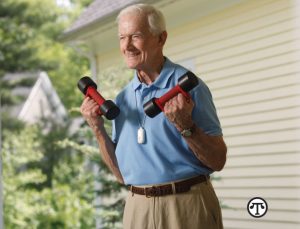 (NAPSI)—Research by the Centers for Disease Control and Prevention shows that falls are the leading cause of fatal and nonfatal injuries for seniors. Fortunately, through a combination of technology solutions and lifestyle choices, seniors can be prepared for the event of a fall, as well as take proactive measures to decrease the likelihood during their lifetime.
(NAPSI)—Research by the Centers for Disease Control and Prevention shows that falls are the leading cause of fatal and nonfatal injuries for seniors. Fortunately, through a combination of technology solutions and lifestyle choices, seniors can be prepared for the event of a fall, as well as take proactive measures to decrease the likelihood during their lifetime.
For example, medical alert devices, such as Philips Lifeline, can provide access to a Response Center to contact emergency help should a fall occur. In the event of a fall, time between the fall and getting medical attention matters. Studies show that seniors using a medical alert device saw an emergency response time more than 320 times faster than seniors having to call for help on their own. Beyond using these devices, seniors should be reminded that staying physically and mentally active can help prevent falls. To begin and maintain this activity, here are three recommended steps seniors can take to support an independent and healthier life:
- Establish a regular fitness regimen. Sedentary lifestyles can gradually cause poor flexibility, loss of strength and decreased bone mass—all of which will increase the chances of falling. Establishing a consistent fitness routine will put your body in better shape and make exercise easier as you get older.
- Adhere to medication and physician orders. Eighty-seven percent of adults aged 65 or older take at least two medications and 42 percent take five or more. With long lists of medication, adherence can be difficult—but it’s vital to follow all directives and advice from your physician to avoid mistakes that can lead to falls.
- Stay social in your community. Although many older Americans value their independence, it’s important to be social and surrounded by others who care about you. This will help lower your chances of depression, make you happier as you age, and increase the chances of someone being there for you if you fall and need help.
If you or a loved one is concerned about fall risk, take this advice to heart and consider sharing with friends. By combining this advice with available technologies, such as medical alert devices, you can be properly prepared for all circumstances.
Learn More- For further information about aging well and learning how you can prevent falls, visit www.lifeline.philips.com
Cynthia Lopinto
Latest posts by Cynthia Lopinto (see all)
- Honey Chocolate–Covered Pretzels - April 3, 2018
- True Colors - April 3, 2018
- Spring Cleaning…You’ve Gotta Be Kidding - April 2, 2018
- Should You Stay In Your Home Or Move During Retirement? - April 2, 2018
- Hawaiian Plants For Good Health - April 2, 2018
 Home Front Magazine A Publication for Seniors
Home Front Magazine A Publication for Seniors

